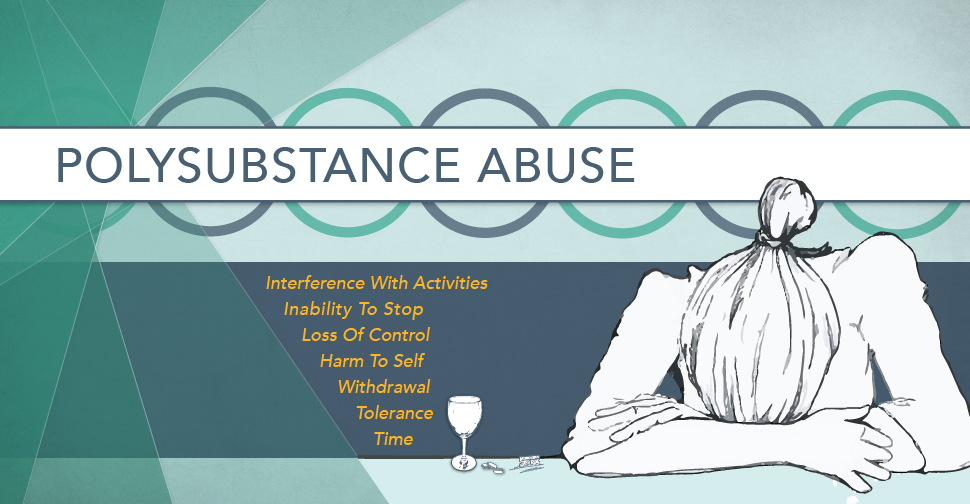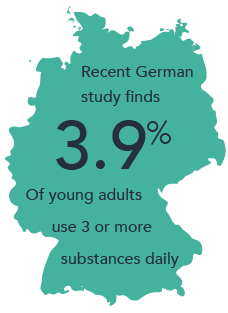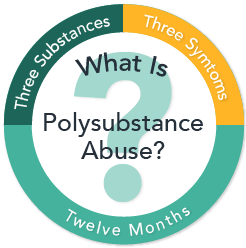
Addiction can take many forms. In some cases, multiple substances are taken simultaneously, posing great risk to those who use them. Interactions between different types of drugs and alcohol can be life threatening, and exacerbate pre-existing conditions. Some cases of polysubstance abuse occur because a high is desired without a preference of substance. The altered state can be derived from use of addictive drugs or alcohol, and usually in excess. Some substances are taken to enhance the reaction of the other, often resulting in adverse effects.
Complications From Polysubstance Abuse
 The prevalence of polysubstance abuse cases cause great concern in the medical community. Physicians are seeing a great number of patients with addictions to multiple substances, making treatment more difficult when the source of an overdose is unknown. Some substances are more likely to be combined than others. Understanding the effects can drastically improve the outcome in the event of overdose. Additional complications from polysubstance abuse disorder include:
The prevalence of polysubstance abuse cases cause great concern in the medical community. Physicians are seeing a great number of patients with addictions to multiple substances, making treatment more difficult when the source of an overdose is unknown. Some substances are more likely to be combined than others. Understanding the effects can drastically improve the outcome in the event of overdose. Additional complications from polysubstance abuse disorder include:
• Long-term use of addictive drugs increases the likelihood of experimentation and addiction of another drug. This can severely impact the risk of overdose and other adverse reactions.
• Difficulty with treatment of overdose, as several substances may be culprit for emergency medical intervention.
• Adverse interactions to combined substances, such as barbiturates and alcohol, can become deadly with just one use.
• Withdrawal periods may become more challenging, as detoxification from multiple substances takes a great toll on the body.
According to results from the National Epidemiological Survey on Alcohol and Related Conditions, around .5 percent of the population engages in polysubstance abuse. These numbers appear to be rising, as a study in Germany suggested that 3.9 percent of survey participants (around 4,000 in the study) ranging from 14-24 years of age engage in the use of three or more substances every day.
Diagnosing Polysubstance Dependence
 The Diagnostic and Statistical Manual of Mental Health Disorders (DSM-IV) offers a range of symptoms to diagnose Polysubstance Dependence. In order for this disorder to be acknowledged as a condition, at least three of these symptoms must exist for three or more substances in patients over a 12-month period:
The Diagnostic and Statistical Manual of Mental Health Disorders (DSM-IV) offers a range of symptoms to diagnose Polysubstance Dependence. In order for this disorder to be acknowledged as a condition, at least three of these symptoms must exist for three or more substances in patients over a 12-month period:
- Tolerance – Higher amounts of a substance used, or the effectiveness of the substance, is less and less (at least 50 percent more is needed to satiate cravings)
- Withdrawal – Withdrawal symptoms when being used, or the drug is used to prevent withdrawal
- Loss of control – Repeatedly using more drugs, or for a longer period than planned
- Inability to stop – Unsuccessful attempt to cut down or stop using substances
- Time – Spending a great deal of time studying, obtaining, being under the influence of, and recovering from drugs
- Interference with activities – Giving up or reducing the amount of time with recreation, socializing, and/or occupational activities due to drug use
- Harm to self – Continuous use of drugs despite physical or psychological problem exacerbated by drug use
Studies support that opiates, marijuana, amphetamines, hallucinogens, inhalants, and benzos are commonly combined. Alcohol, cocaine, and opiates are often used together or interchangeably. Any combination of substances can be dangerous. Thankfully, there are options for polysubstance treatment.
Treating Polysubstance Abuse
When multiple substances are abused, some patients experience a more difficult time with detoxification and a heightened likelihood of relapse. While many cases of polysubstance abuse tend to go untreated, patients wishing to recover from addiction have a variety of options to find relief. Some options for addiction recovery include:
• Outpatient treatment centers
• Cognitive behavioral therapy
• Medications such as Suboxone, Methadone, Acamprosate, and Disulfiram to relieve withdrawal symptoms
Convincing a loved one to seek treatment for polysubstance abuse issues can be very difficult. Multiple addictions can multiply the amount of discomfort when leaving the lifestyle behind. Many patients find that letting go of multiple substances can be that much more rewarding when treatment is over.
Hope For Polysubstance Abuse Patients
Addiction can be a very scary condition to fight alone. When more than one substance has taken hold, it can significantly impact the recovery rate of those struggling with addiction. Thankfully, there are many ways to help. Staff and administrators involved in rehabilitation procedures are well trained in treating polysubstance abuse disorders in patients. Honestly disclosing all drug and alcohol intake can assist staff in properly combating the effects of withdrawal during detoxification. This will both ease the transition into recovery and ensure a safe, comfortable rehabilitation experience.
We Can Help
 Polysubstance abuse affects the lives of many people. If you need help finding treatment for addiction, the caring staff at DrugRehab.org is here to help. We can connect you with resources, provide guidance, and answer any questions you have to help find relief. Contact us today.
Polysubstance abuse affects the lives of many people. If you need help finding treatment for addiction, the caring staff at DrugRehab.org is here to help. We can connect you with resources, provide guidance, and answer any questions you have to help find relief. Contact us today.

